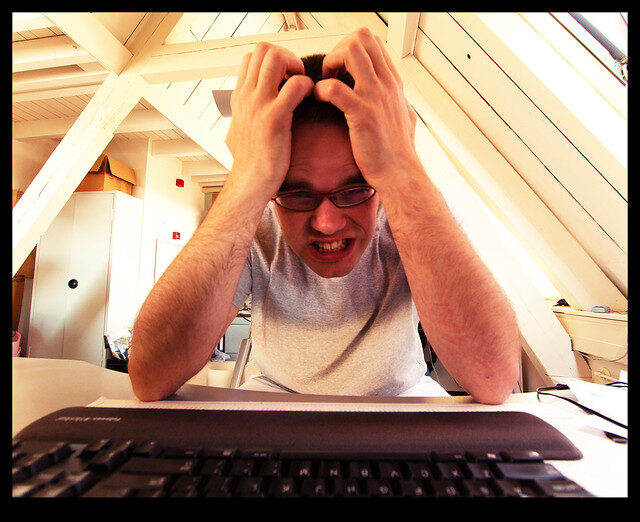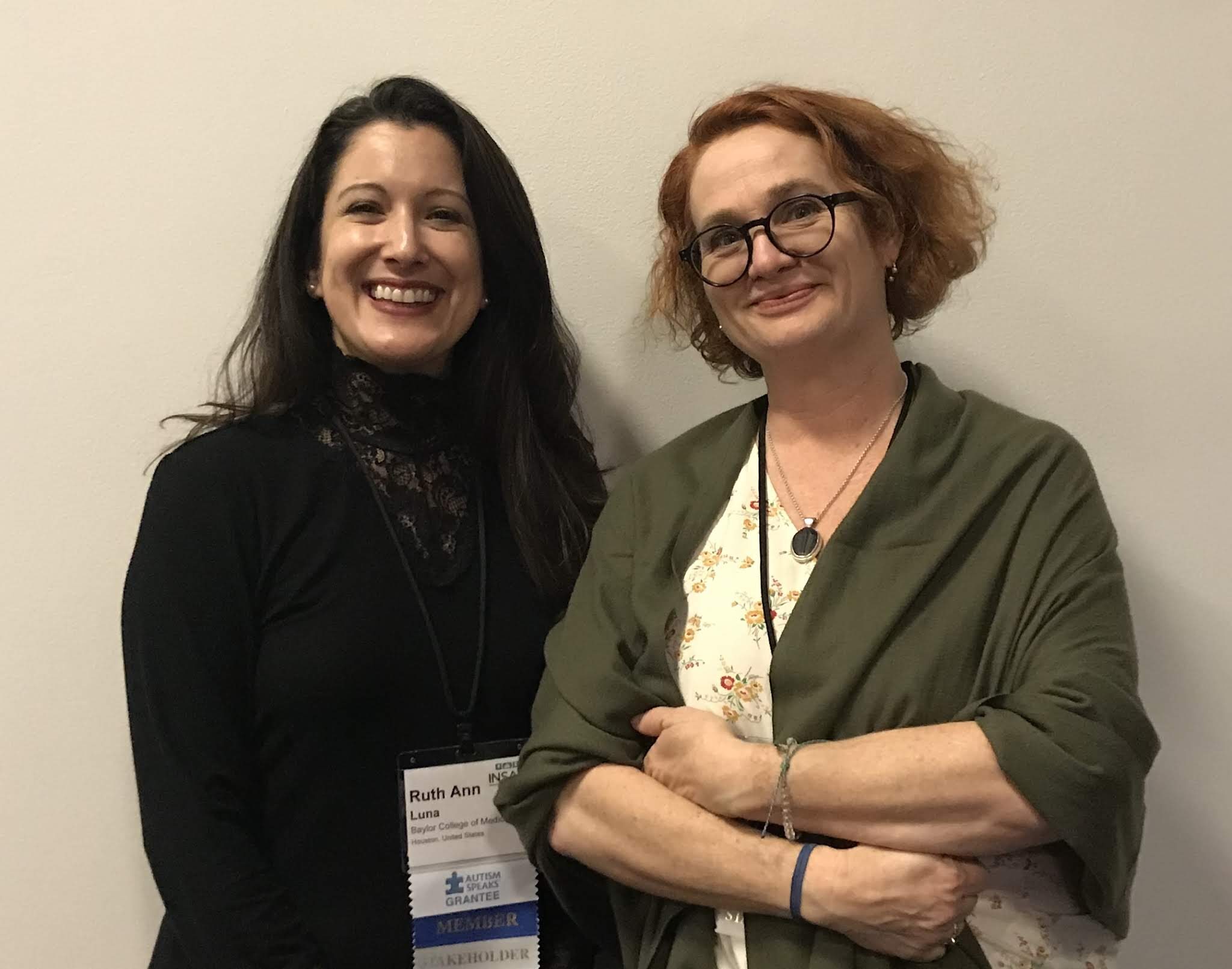Photo © Sybren Stüvel | Flickr / Creative Commons [image: Frustrated white person at a computer keyboard. Their hands are on their head covering their hair, and they are wearing glasses.] Maxfield Sparrow UnstrangeMind.com Like many folks, I had not heard of Zoom before the pandemic. My friends in IT tell me they were using it for work meetings before much of the United States went into self-quarantine, shelter in place, lockdown, or whatever you want to call the “social distancing” we were urged to observe to help slow the spread of the virus. One bonus for me of the way things have shifted during the pandemic is that I’ve been able to join small groups of people from whom I’m genuinely geographically isolated. For the holy season, I celebrated in community with a Lodge in Sacramento. My friend, Smash Ford, invited me to attend a meeting of the Non-Binary Union…
Tag: anxiety
Photo © Tony Cheng | Flickr / Creative Commons [image: Blue medical mask painted with a toothy, red-lipped smile.] Content note: Discussion of self-injury, self-harm, and aggression. —- Of all the varied stress bombs COVID-19 has lobbed at autistic people and their families, one of the more universal is the stress caused by routine disruption, coupled with constant close quarters. Few of us are at our best under such circumstances, so we wanted to share some advice and insights from autistic people and/or parents who are experiencing what you are experiencing about handling some of the tougher aspects, like increased tendencies towards self-injury and aggression. We also want to direct people towards our existing resources: Autistic Insights on Meltdowns, Aggression, and Self-Injury Understanding Autism, Aggression, and Self-Injury: Medical Approaches and Best Support Practices Behaviour Analysis, The Autistic Way Eleven Ways You Can Make Your Autistic Child’s Life Easier First, we…
Carol Greenburg twitter.com/autisticenough Image © Shannon Des Roches Rosa [image: Photo of six people, seen from behind looking at downtown San Francisco from atop Twin Peaks.] Now that every rule of social engagement we’ve painstakingly tried to learn has been turned upside down by social distancing, it’s not just our routines that are disrupted: It’s our whole concept of the importance of Rules. I’ve heard many parents say their autistic kids are “rule-followers” and bitten my tongue wanting to ask if they thought it’s because we’re naturally rigid, or because we’ve been undergoing compliance training for as long as we can remember. Regardless of the origin, many of us cling desperately to whichever skills that get us approval rather than admonishment. Not always a bad thing, many rules certainly do make sense in appropriate context. All we-were-made-for-this jokes aside, social distancing is a stark example of a good rule in…
On being angry and frustrated at the celebration at children’s “recovery” from autism, by people who will not actually bear the consequences of losing that diagnosis, for the rest of their lives.
Dr. Ruth Ann Luna and Shannon Rosa. Photo © TPGA [image: A Latina woman with long dark brown hair, and a white woman with chin-length fluffy red hair and glasses, smiling and posing together.] Our editors Carol Greenburg and Shannon Rosa spoke with Dr. Ruth Ann Luna about her research on autistic kids and their incredibly diverse gut microbiomes during INSAR 2019, How her research is not about “special diets for autism,” how GI issues are co-occurring conditions and not a core trait of autism, how there’s no one universal single bacteria that is associated with autism, how GI profiles are ofter family- rather than neurotype-specific, and how this research may translate into real world supports for autistic people. —- Shannon Rosa: Thank you so much for being here. Can you tell us a little bit about your background and what brought you into this area of autism and gut microbiome research?…
There are far too many examples of autistic people being arrested or sectioned, let alone reprimanded or ostracised, for having a meltdown—a reaction to difficulty and stress that is normal to our way of being, but not nearly well enough understood by others.
I believe that the best way to understand autistic minds is in terms of a thinking style which tends to concentrate resources in a few interests and concerns at any time, rather than distributing them widely.
Kerima Çevik theautismwars.blogspot.com The author’s idea of what displaying autism positivity looks like [Image: a Black woman over 50 with braided gray hair wearing Neurodiversity 3.0 by ThinkGeek, a black T-shirt with a world globe design on the upper chest area in the shape of a human brain, colored in physical map fashion i.e., water is colored light blue and land masses green, clouds white, looking to her left over bent wire-rimmed glasses in that way that mothers look at their children when an outrageous behavior has just ensued.] There is an article in a paper called The Daily Net, about singer Toni Braxton’s 16-year-old son Diezel working as a professional model for the past two years. The article refers to him as “formerly autistic.” It goes on to say he has, “fortunately, moved past” autism and is now a celebrity himself. Apparently, when her son was thirteen, Ms. Braxton…
Photo © Taston | Flickr / Creative Commons [image: A white person’s hand reaching for a blister pack of red & blue pills] Maxfield Sparrow unstrangemind.com Autistic people stereotypically don’t drink alcohol, or take drugs. We love clear boundaries and rules, so we don’t do anything illegal. We’re generally less susceptible to peer pressure. And everyone knows drinking is a social activity, so obviously autistic people wouldn’t even drink, let alone become alcoholics. Right? Wrong. Not only do some autistics drink and/or use drugs, but we risk addiction as well. The roots of autistic people’s addiction can go all the way back to childhood, so it’s very important to think about how we are raising autistic children today—if we want to help them avoid the pitfalls of addiction in the future. Why Do Autistics Drink and/or Use Drugs? This question is easy to answer. Ask any autistic person—even those who…
The problem is not autistic hand flapping. The problem is when the decision has been made that hand flapping is annoying or weird, and not natural (and adorable!).









